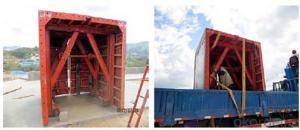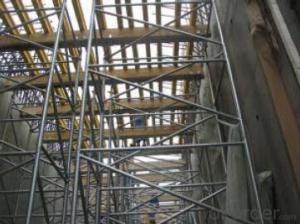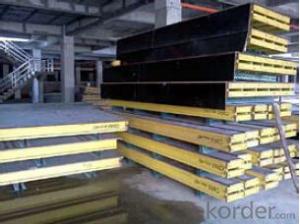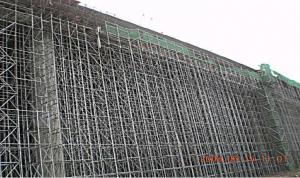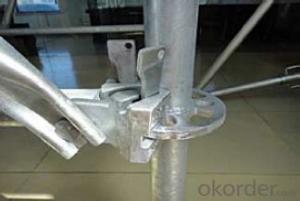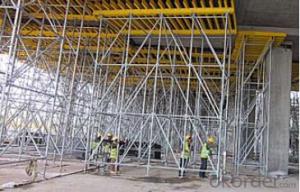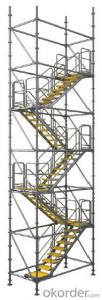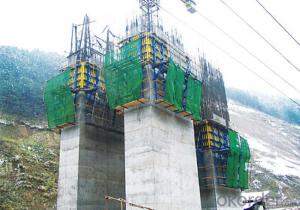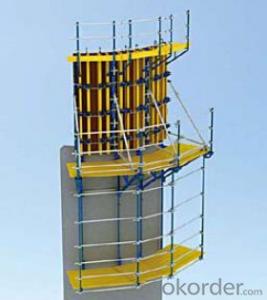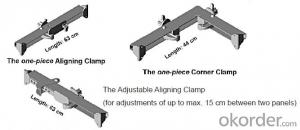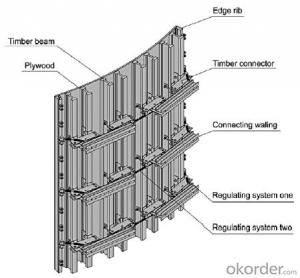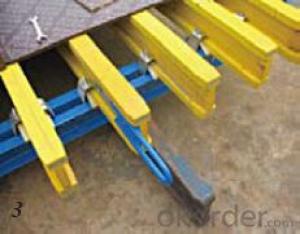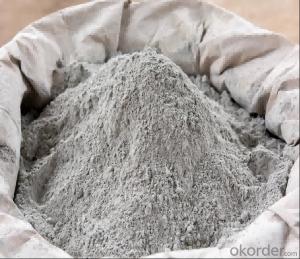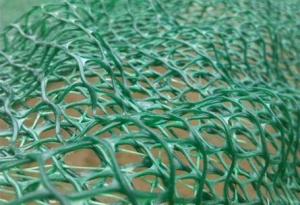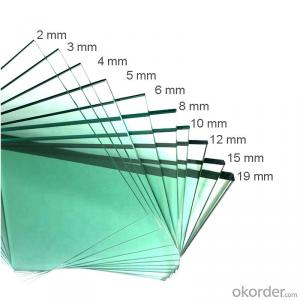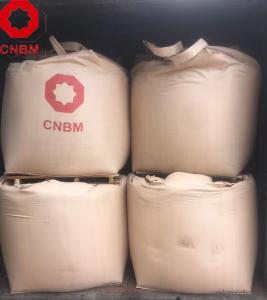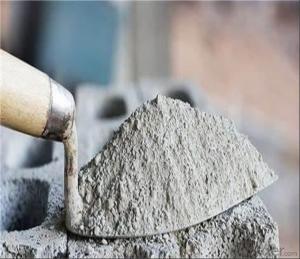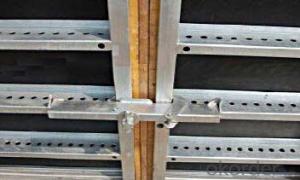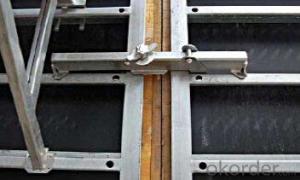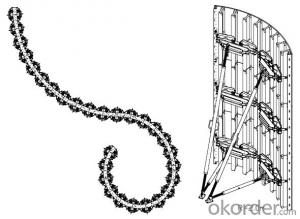Heavy Duty Whole Steel Formwork for Bridge Construction
- Loading Port:
- Tianjin
- Payment Terms:
- TT or LC
- Min Order Qty:
- 300 m
- Supply Capability:
- 100000 m/month
OKorder Service Pledge
OKorder Financial Service
You Might Also Like
1. Structure of Heavy Duty Whole Steel Formwork
A compositional steel formwork system mainly used in the building which has regular structure without beams, the excellent formwork system can make the integral pouring for the wall & slab easily achieved.
2. Main Features of Heavy Duty Whole Steel Formwork
◆ High stiffness, make perfect shape for concrete.
◆ Easy operation, save labor and force.
◆ Fast forming, repeatedly turnover.
◆ No assembling, easy operation with formed formwork.
◆ High stiffness, make perfect shape for concrete.
◆ Repeatedly turnover is available.
◆ Widely applied range, such as building, bridge, tunnel, etc.
3. Heavy Duty Whole Steel Formwork images
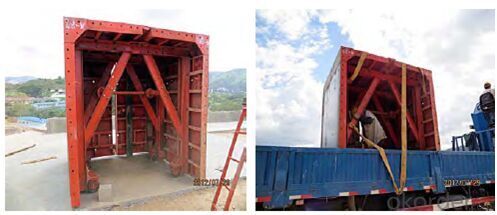
4. Heavy Duty Whole Steel Formwork Specifications
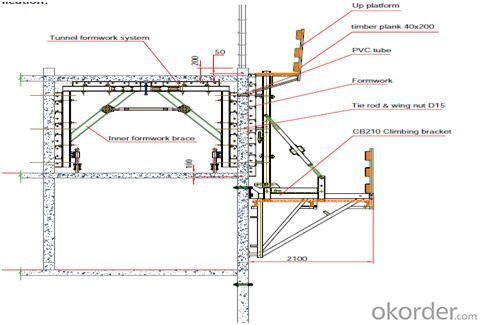
5. FAQ of Heavy Duty Whole Steel Formwork
1) What can we do for you?
.We can ensure the quality of the Heavy Duty Whole Steel Formwork and avoid extra expenses for customers.
.We can provide you the professional technical team.
.We can provide professional building proposal for your projects.
2) What promises can be done by us?
. please feel free to write us for any QUOTE.
. If need any technical and building assistance, we could provide on-site professional staff for instruction.
. Please DO check goods when courier knocks your door and contact us asap if any issues.
3) What about of our after-sale services?
. Response will be carried out in 24hours after receiving any complain or request.
. Any formwork cost can be refund after order is confirmed.
. If the products are not based on the requirements, there will be the relevant compensations made for you.
4) What about the package and shipping time?
.Packing: wood package and adhesive tape
.Shipping: by sea
Shipping time: Normally small orders, it just1week business days to arrive your hand; When comes to the customs declaration, it may need 2weeks.
- Q:Can steel formwork be used for both new construction and renovation projects?
- Yes, steel formwork can be used for both new construction and renovation projects. Steel formwork is highly versatile and can be easily adapted to fit various project requirements. It provides excellent strength and durability, making it suitable for both small and large-scale projects. Steel formwork can be used for constructing new structures as well as for renovating existing ones. It offers the advantage of being reusable, reducing costs and waste in the long run. Additionally, steel formwork allows for precise and accurate construction, ensuring high-quality results in both new construction and renovation projects.
- Q:All I know is that prices are different
- As a result of the construction of the steel template is generally made in accordance with the size of the module, it is easier to support, but also easy to install and disassemble
- Q:How does steel formwork prevent concrete shrinkage and cracking?
- Steel formwork helps prevent concrete shrinkage and cracking by providing strong and rigid support during the curing process. When concrete is poured into the steel formwork, it takes the shape of the structure being built and hardens over time. The steel formwork acts as a mold, holding the concrete in place and preventing it from shrinking or cracking as it dries. One of the main causes of concrete shrinkage and cracking is the loss of moisture during the curing process. As the water in the concrete evaporates, it causes the material to shrink. This shrinkage can lead to cracks forming in the concrete if it is not properly supported. Steel formwork helps prevent this shrinkage by providing a tight and secure enclosure for the concrete. It ensures that the concrete retains its moisture and does not dry out too quickly. This slow and controlled drying process allows the concrete to cure evenly and reduces the likelihood of shrinkage and cracking. Additionally, steel formwork provides stability and support to the concrete, preventing it from moving or shifting as it hardens. This stability helps to distribute the forces and stresses evenly, reducing the risk of cracking or structural failure. Furthermore, the smooth and rigid surface of steel formwork helps to achieve a high-quality finish on the concrete. This prevents any irregularities or imperfections that may weaken the structure or make it more susceptible to cracking. In summary, steel formwork plays a crucial role in preventing concrete shrinkage and cracking by providing support, stability, and moisture retention during the curing process. Its strong and rigid structure ensures that the concrete remains intact and achieves a high-quality finish, reducing the risk of structural issues and enhancing the durability of the construction.
- Q:How does steel formwork handle different concrete pouring techniques?
- Steel formwork is a versatile and durable option for handling different concrete pouring techniques. Its strength and rigidity allow it to withstand the pressure exerted by various pouring methods, ensuring a stable and secure structure. One common pouring technique is the traditional gravity pouring, where concrete is poured into the formwork from the top and allowed to flow downwards due to its own weight. Steel formwork is well-suited for this method as it can easily contain the concrete and prevent any leakage or spillage. The formwork's tight joints and sturdy panels ensure that the concrete remains in place and is evenly distributed throughout the formwork. Another technique is the pumping method, where concrete is pumped into the formwork using specialized equipment. Steel formwork can handle this technique effectively as it can withstand the force and pressure exerted by the pumping process. The formwork's robust construction and reinforced edges provide the necessary support to contain the concrete and prevent any deformation or leakage. Steel formwork is also compatible with the slip-forming technique, which involves continuously pouring concrete into a moving formwork system. This method requires a formwork system that can be easily moved and adapted to changing shapes and heights. Steel formwork's modular design allows for quick and efficient adjustments, making it suitable for slip-forming applications. Additionally, its strength and stability ensure that the formwork remains intact during the continuous pouring process. In summary, steel formwork is a reliable choice for handling different concrete pouring techniques. Its strength, rigidity, and adaptability make it capable of withstanding the pressure and forces exerted by gravity pouring, pumping, and slip-forming methods. With steel formwork, builders and contractors can confidently execute various concrete pouring techniques, resulting in high-quality and structurally sound construction projects.
- Q:What are the different types of steel formwork available?
- In the construction industry, there exists a variety of steel formwork options, each possessing its own distinctive characteristics and benefits. Some of the most prevalent variations include: 1. Modular steel formwork: This formwork type comprises pre-made steel panels that can be effortlessly assembled and disassembled. It boasts customization capabilities and can accommodate concrete structures of diverse shapes and sizes. 2. Tunnel formwork: Specifically designed for tunnel and underground structure construction, this formwork variant is forged from steel plates. Its robust construction enables it to withstand high pressure and deliver a polished finish to the concrete. 3. Climbing formwork: Tailored for tall structures such as skyscrapers, climbing formwork is engineered to be lifted and moved vertically as construction progresses. This type of formwork ensures both safety and efficiency during the construction of multi-story buildings. 4. Steel soldier formwork: A versatile and cost-effective option often employed for walls and columns, steel soldier formwork is constructed using steel beams and soldiers. It can be easily adjusted to accommodate different heights and widths. 5. Steel frame formwork: Comprised of steel frames with attached plywood or metal panels, this lightweight formwork type is easy to handle and guarantees a smooth concrete finish. 6. Steel table formwork: Ideal for large horizontal slabs, steel table formwork utilizes steel tables supported by props or scaffolding. Its quick assembly and dismantling make it perfect for projects with tight timelines. These examples represent only a fraction of the available steel formwork options. The selection of formwork depends on project-specific requirements, including the structure type, load-bearing capacity, and desired finish.
- Q:Can steel formwork be used in marine construction projects?
- Certainly, marine construction projects can make use of steel formwork. Steel formwork, being a robust and flexible construction material, is capable of enduring the challenging conditions typically found in marine environments, such as saltwater, waves, and corrosion. It is frequently employed in marine construction projects for a variety of purposes, including the construction of piers, docks, seawalls, and other structures that necessitate a resilient and stable foundation. Steel formwork offers exceptional structural support and can withstand the immense loads and pressures that are commonly associated with marine construction. Furthermore, its ease of assembly and disassembly renders it a practical selection for marine construction projects, where time and efficiency are of utmost importance. All in all, steel formwork proves to be a dependable and appropriate choice for marine construction projects.
- Q:What are the characteristics of steel formwork
- 5, good insulation performance, is conducive to the preservation of concrete in winter.6, easy maintenance, can be repaired in the local damage surface, when one side wear, you can flip the use of the plate.
- Q:I would like to ask, large steel formwork and the average number of square meters of a template?
- You can find the local rental station under the general template is charged by the day rental fees
- Q:Can steel formwork be used for staircases and ramps?
- Steel formwork is indeed capable of being utilized for the construction of staircases and ramps. It possesses a great deal of versatility and durability, making it an ideal choice for the creation of intricate shapes and structures. The strength and stability that it offers are essential for supporting the weight and loadings associated with staircases and ramps. Moreover, the assembly and disassembly of steel formwork can be accomplished with ease, allowing for efficient construction and customization of staircases and ramps. Its flexibility enables the creation of diverse designs and sizes that cater specifically to the requirements of a given project. In conclusion, when considering the construction of staircases and ramps, the use of steel formwork is highly suitable due to its strength, durability, versatility, and user-friendly nature.
- Q:Can steel formwork be used for both residential and commercial construction projects?
- Yes, steel formwork can be used for both residential and commercial construction projects. Steel formwork is a versatile and durable option for creating concrete structures, including walls, columns, beams, and slabs. It offers several advantages such as high load-bearing capacity, dimensional accuracy, and reusability, making it suitable for various construction projects. In residential construction, steel formwork can be used for building foundations, retaining walls, and even for creating decorative elements. In commercial projects, it can be used for constructing office buildings, shopping malls, industrial facilities, and other large-scale structures. Additionally, steel formwork allows for faster construction and better quality control, resulting in time and cost savings for both residential and commercial projects.
1. Manufacturer Overview |
|
|---|---|
| Location | |
| Year Established | |
| Annual Output Value | |
| Main Markets | |
| Company Certifications | |
2. Manufacturer Certificates |
|
|---|---|
| a) Certification Name | |
| Range | |
| Reference | |
| Validity Period | |
3. Manufacturer Capability |
|
|---|---|
| a)Trade Capacity | |
| Nearest Port | |
| Export Percentage | |
| No.of Employees in Trade Department | |
| Language Spoken: | |
| b)Factory Information | |
| Factory Size: | |
| No. of Production Lines | |
| Contract Manufacturing | |
| Product Price Range | |
Send your message to us
Heavy Duty Whole Steel Formwork for Bridge Construction
- Loading Port:
- Tianjin
- Payment Terms:
- TT or LC
- Min Order Qty:
- 300 m
- Supply Capability:
- 100000 m/month
OKorder Service Pledge
OKorder Financial Service
Similar products
New products
Hot products
Hot Searches
Related keywords
